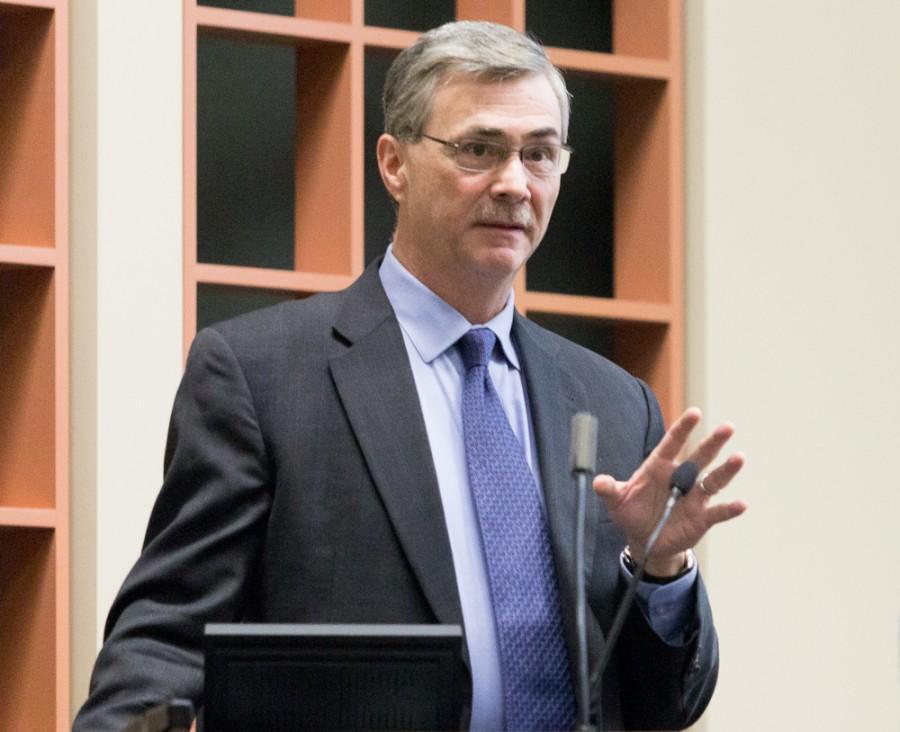Tax policy for education evaluated
October 27, 2014
The public education system in America suffers from not being broken, but rather falls victim to being under resourced — as test scores prove.
The lack of resources solution stems from the tax policy currently in place —all of which was the focus of Ralph Maritire’s presentation Monday.
Maritire, the executive director of the Center for Tax and Budget Accountability, entered the Buzzard Auditorium, and showed the tax policy in Illinois currently helps contribute to the downfall of the education system.
The tax policy, which links property tax to education, is proven through looking at test scores and poverty levels.
Maritire said in areas of poverty levels at 0 to 10 percent, children scored the highest on math — making it to No. 1 in the world.
When students in the 10.1 percent to 24.9 percent poverty range took the test, they scored fourth highest in math.
However, Maritire said the problem occurs when looking at people in the 25 percent poverty range, which is when students “fall off the map.”
He said while instead of focusing on using the money to fund education, America, like other countries had become “infected by the GERM.” GERM, or Global Education Reform Movement, gives a list criterion for students to meet—mostly higher standardized testing.
“It doesn’t actually fund schools to actually educate children to the point where they could meet this standard,” Maritire said. “Who thought this would work?”
Just by having a standard out there for students to meet will not drive the students to be motivated to meet it, Maritire said.
Maritire added the GERM also enhances accountability metrics and implements punitive consequence matrixes.
“Accountability, much like standardized tests, does not drive or enhance student achievement,” he said. “Do you want your system to be accountable? Yes. But you do want your system to be informational and improve practicum.”
The GERM also implements enhancing competition between and among schools and educators, another point Maritire opposed.
Maritire said education should not be a competition and that when given the Programme for International Student Assessment test in 2009, “every nation watched math scores drop.”
Maritire offered solutions on how to approach the tax policy dilemma currently spiraling through Illinois.
Everything stemmed from the idea that more taxation was needed, but needed to be redirected properly — mostly at public education.
Retirement income should be taxed, Maritire said. But at different levels of income, so the retirees are still above the cost of living line at all times.
A projected $1.2 billion increase in revenue would be a result of taxing Illinois retirees on their retirement income.
He also suggested raising the personal income tax to 6 percent, and enhances existing and add new refundable credits for fair tax.
The fair tax, which he credited to Adam Smith, would see the wealthier taxed more, rather than the middle and lower levels.
Taxes should also be levied against intangible services, such as haircuts. Whereas the current taxes in Illinois only apply to tangible goods, such as clothes and food, the tax on intangible services would help increase revenue throughout Illinois.
“You don’t see buses of people from Indiana and Wisconsin coming over the border for haircuts, do you?” Maritire said. “Those are both states that tax intangible services.”
Maritire also pointed out the wage gap between white people and minorities were getting worse, not better.
He said the wage gap between white people and Hispanic people, since 1984, have grown by 46 percent.
“Some of that is discrimination and other problems, but some of it is actually neutral labor market forces in play,” he said.
He said a few factors contributed to this girth of a gap. Including in the factors came ideas such as education and English being a second language — all contributed to the widening gap.
And when it came to the gap between white people and black people, Maritire said the gap was at a 92 percent.
“As far as neutral labor forces markets go, I’ve got nothing,” Maritire said. “There’s two things happening here: discrimination, which clearly impacts labor markets, and how we fund schools.”
He said in terms of discrimination, it doesn’t matter how one looks at the data—they will find discrimination, even leading up through the Great Recession of 2008 and into 2014.
However, when it comes to funding schools, Illinois is the most reliant state in the country on property taxes to fund education, Maritire said.
Maritire said 93 percent of black children lived in low-income areas throughout Illinois, which contributed to the fact that the schools they attend were poorly funded.
Maritire said with the issues facing school institutions right now, it would be beneficial for present and future educators to get behind altering the tax policy in order to secure the state of the school system.
“We can solve our problems by fixing tax policy in the right way,” he said.
Bob Galuski can be reached at 581-2812 or [email protected].


















































